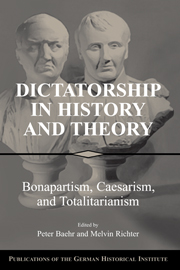Book contents
- Frontmatter
- Introduction
- PART I BONAPARTISM TO ITS CONTEMPORARIES
- PART II BONAPARTISM, CAESARISM, TOTALITARIANISM: TWENTIETH-CENTURY EXPERIENCES AND REFLECTIONS
- PART III ANCIENT RESONANCES
- 12 Dictatorship in Rome
- 13 From the Historical Caesar to the Spectre of Caesarism: The Imperial Administrator as Internal Threat
- Index
12 - Dictatorship in Rome
Published online by Cambridge University Press: 05 January 2013
- Frontmatter
- Introduction
- PART I BONAPARTISM TO ITS CONTEMPORARIES
- PART II BONAPARTISM, CAESARISM, TOTALITARIANISM: TWENTIETH-CENTURY EXPERIENCES AND REFLECTIONS
- PART III ANCIENT RESONANCES
- 12 Dictatorship in Rome
- 13 From the Historical Caesar to the Spectre of Caesarism: The Imperial Administrator as Internal Threat
- Index
Summary
The word “dictatorship,” a simple nativized version of a Roman term, has had two quite distinct senses in European history, at least since Cromwell. On the one hand, paralleling what one might call the “classical” or original Roman dictatorship, it refers to an exceptional but regular and quasi-constitutional power conferred according to precisely defined procedures upon a magistrate (or in modern Europe, a government or assembly) under critical circumstances, in order to confront an external or internal state of emergency in the name of the common good. In brief, this is what Theodor Mommsen called “an exceptional power, roughly equivalent to what today is called suspension of civilian jurisdiction and the declaration of a state of siege” (Le Droit public, III, 187). On the other hand, since the eighteenth century, and most particularly, of course, since the French Revolution, the same term has served to refer to despotisms or tyrannies - in other words, essentially powers which are far from having been regularly conferred, and instead have been usurped through force or deceit, most often by one man, but sometimes by an assembly, sect, or party. The “tyrannical” nature of a dictatorship as understood in this second sense is most often accompanied by the idea of an arbitrary, abusive power, which overthrows political or individual rights, governs by terror, and does not recoil from the most extreme violence. It is not just in recent times that the term's ambiguity has afforded a way of manipulating hearers' sensibilities in political or polemical discourse.
- Type
- Chapter
- Information
- Dictatorship in History and TheoryBonapartism, Caesarism, and Totalitarianism, pp. 263 - 278Publisher: Cambridge University PressPrint publication year: 2004
- 4
- Cited by

